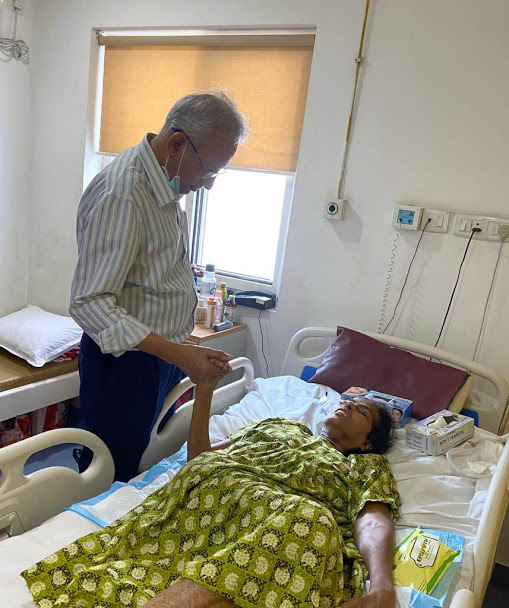This is a gross misconception. Morphine is specifically a pain-relieving medication for tissue injury-related pain but may not be effective for all types of pain. Additionally, patients may experience other distressing symptoms such as nausea, non-healing ulcers, and various urinary, gynecological, and neurological issues where morphine has no role in treating these conditions, each of which requires appropriate medical treatment.



What is Palliative Care
Bridging the Gap Between Cure and Care
Palliative (‘Paliate: To Relieve) Care is an approach which focuses on relieving distressing physical symptoms and emotional challenges caused by chronic and life-threatening diseases. Its primary goal is to enhance the quality of life for both patients and their families.
Palliative Care complements all medical specialties, ensuring comprehensive, need-based support throughout a patient’s illness—not just in the final stages. It is not merely end-of-life care but an integral part of treatment, helping to palliate distressing symptoms whenever they arise.
Misconceptions about Palliative Care & Treatment
Palliative Care is for patients for whom doctors have nothing further to do
This is a myth! Patients may reach a stage when there is no more treatment for the disease & palliative care is the only option. But this does not mean they did not suffer before this stage! Palliative Care is NEED-BASED and helps the patient and family as and when the need arises, throughout the illness.
Is not Palliative Care ONLY about counseling?
This is a MYTH. Aim of Palliative Care is to improve quality of life. This cannot be achieved by Counseling alone. Patients’ distressing physical symptoms need to be treated first before addressing their emotional issues. For example, a patient in severe pain cannot be counseled till his physical pain is first relieved! So, Palliative Care includes medical treatment of the physical symptoms as well as counseling to relieve the emotional distress.
Morphine is the only medicine given in Palliative Care
Other Questions
What is the difference between Palliative Care & Hospice Care?
Palliative Care spans from diagnosis through treatment and advanced stages, extending beyond death into bereavement support. Hospice Care, a subset of palliative care, is specifically for patients with a life expectancy of six months or less, often linked to insurance in Western countries. Both focus on relieving suffering and enhancing quality of life.
If a patient is referred to a specialist in Palliative Medicine, does it mean he is in the terminal stage?
NO, DEFINITELY NOT!! ‘Palliate’ means ‘relieve suffering’ When does suffering begin? It could start from the very time of diagnosis of a dreadful disease like cancer!
Palliative Care can help right from this time when both patient and family need skilled counseling and compassion to understand their emotions – fears, anxieties and dilemmas related to decision making – and address them accordingly. The care may also be needed during active treatment of cancer (for treatment of side effects) and other chronic diseases and more so in the advanced stage. It is a form of SUPPORTIVE CARE adding an extra layer of support to the patient and family by relieving their distressing physical and emotional symptoms throughout the disease trajectory including the treatment period. In fact, Palliative Care is now considered as part of treatment of any disease at any stage and at any age. (WHO Mandate May 2014)
We don’t want to opt for Palliative Care. We don’t want to give up as yet.
This is a common misconception, often reinforced by professionals, that Palliative Care is only for the terminal stage. In reality, it applies at any stage of an illness, improving quality of life from the beginning. Many patients, after experiencing relief, have said, “I wish we had seen you earlier!” Raising awareness among both the medical community and the public is essential to ensure no one suffers unnecessary pain—physical or emotional—at any stage of illness.
When should we go to a Palliative Care doctor, if diagnosed with a life limiting illness?
Palliative Care begins the moment fear, anxiety, or the need for clarity arises—whether for the patient or their family. It provides support for physical and emotional suffering from the very start and can be integrated alongside curative treatment. It is available at any stage of illness to relieve distressing symptoms whenever needed.
Can a family member of a patient reach out to Palliative Care?
Of course, family members are the primary caregivers. Any query from them will be answered and clarified. After all Palliative Care is supportive care for patient AND family, because when a person is diagnosed with a life-limiting / chronic illness, the family is also affected in various ways and may need guidance and a sense of direction.
Do Palliative Care doctors come on home visits?
Yes, most doctors specialized in Palliative Care do make home visits when needed. Each patient is assessed individually, and if a home visit is required to provide relief, doctors or their team will respond accordingly. Often, nurses also visit patients at home, and in some cases, a trained nurse or volunteer may be sufficient to provide the necessary care.
Can cancer spread from one person to another?
CERTAINLY NOT!
Cancer is not an infection and is a not contagious disease. It will NOT spread from one person to another. You can live in the same room and eat from the same plate! You can touch and take care without any fear or doubt.
One of my family members had cancer. Will I also get it?
Not necessarily.
But certain cancers may be hereditary which means a person may be at a higher risk of getting cancer if his/her relatives have had that particular cancer e.g. breast, ovarian, colorectal cancers. When in doubt write to us or talk to your doctor..
Can Volunteers do Palliative Care?
YES!! After basic training in Palliative Care, volunteers can support those in need by joining a team of doctors, nurses, psychologists, and social workers. A significant part of the suffering experienced by patients and caregivers is emotional, social, and spiritual. With strong communication skills, background knowledge of palliative care, and guidance from specialists, volunteers can play a vital role in improving the quality of life for both patients and their families by dedicating their time to this cause.
Who should reach out for Palliative Care?
Any patient, whether facing a chronic or acute illness, can seek Palliative Care. This includes those undergoing curative treatment, those with life-limiting conditions, and even those recovering from severe illnesses. Patients with cancer, chronic liver, kidney, lung, and heart diseases, neurological conditions, and age-related illnesses can benefit, as well as those experiencing prolonged pain like chronic arthritis or low backache. Additionally, individuals with acute conditions such as COVID-19 or drug-resistant TB (Refractory TB) may also require palliative support to manage distressing symptoms and improve quality of life.
Doesn’t Tablet Morphine lead to addiction?
NEVER! First I ask, “Will doctors prescribe an addiction causing medicine?!
What is addiction? It is the ‘kick’ (euphoria) that one gets when an addiction forming chemical gets absorbed rapidly into the blood circulation. This can only occur with drugs that are inhaled or injected and not with the tablet. An addict’s abnormal behavior is in clear contrast to the normal behavior and functioning of the patient whose pain is relived and can go back to social circulation. Millions of patients all over the world are given this tablet with NO REPORT OF ADDICTION. (Please note: It is only the injection form that can lead to addiction, that too only when taken by normal people and not in those with severe cancer pain!)
Isn’t Palliative Care 'end of life care'?
‘End-of- life’ care is only one aspect of Palliative Care. ‘Palliative Care’ refers to a wider spectrum, applicable from the beginning to the end-of-life stage and includes bereavement care. The term, ‘End-of- life’, is often used in the west where it is referred to a patient with a ‘serious illness’ but can live for a few years. But in the east, we have the tendency to equate ‘End-of-life’ to ‘terminal’ care; hence the use of the term, ‘Palliative Care’ is to be encouraged in our country and ‘End-of-life’ only to those who are not expected to live for more than a few months.
How can I get the support of Palliative Care, if I want it?
Simply call or email us or any other organization trained in the field.